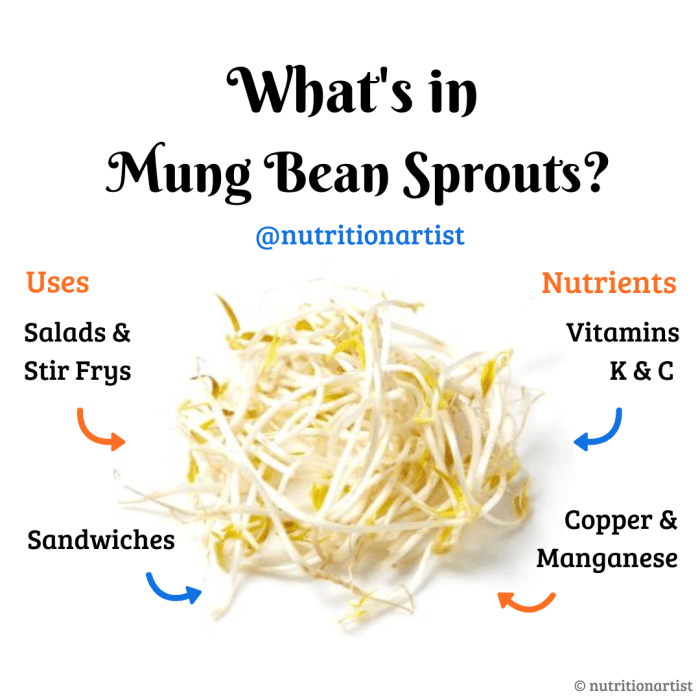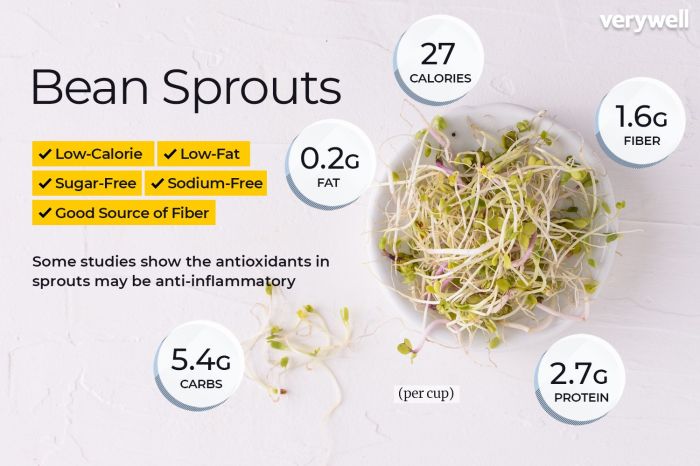Bean Sprout Types and Nutritional Variations

Bean sprouts nutrition facts – Bean sprouts, those crunchy and nutritious additions to salads and stir-fries, come in a variety of types, each boasting a slightly different nutritional profile. Understanding these variations can help you make informed choices to maximize the health benefits in your diet. The nutritional content can also be influenced by growing methods and conditions, further adding to the complexity and interest of these humble sprouts.
Bean sprouts, packed with vitamins and low in calories, offer a healthy boost to any diet. However, if you’re craving something richer, understanding the nutritional profile is key. For a different perspective on protein and fat content, check out the ribeye steak nutrition facts , then remember that bean sprouts remain a fantastic, lightweight option for maintaining a balanced and nutritious lifestyle.
They’re the perfect complement to a more indulgent meal.
Nutritional Comparison of Different Bean Sprout Types
The nutritional composition of bean sprouts varies depending on the type of bean from which they are grown. Mung bean, soybean, and alfalfa sprouts are commonly available and offer distinct nutritional benefits.
- Mung Bean Sprouts: These are perhaps the most common type, known for their mild flavor and high water content. They are a good source of vitamin C, folate, and fiber. Their relatively low calorie count makes them a popular choice for weight management.
- Soybean Sprouts: These sprouts offer a higher protein content compared to mung bean sprouts, making them a valuable addition to vegetarian and vegan diets. They also contain isoflavones, compounds with potential health benefits, including antioxidant and anti-inflammatory properties. However, they might have a slightly stronger, beany flavor.
- Alfalfa Sprouts: Rich in vitamins K and A, alfalfa sprouts are often touted for their potential to support digestive health. They also contain a variety of minerals. Their slightly bitter taste might not appeal to everyone.
Nutritional Differences Based on Growing Methods
The method used to grow bean sprouts significantly impacts their nutritional profile. Hydroponic and soil-based cultivation offer contrasting results.
| Nutrient | Hydroponic Sprouts | Soil-Based Sprouts |
|---|---|---|
| Vitamin C | Generally higher | Generally lower |
| Nitrate Levels | Typically lower | Potentially higher, depending on soil and fertilization practices |
| Mineral Content | Can vary depending on nutrient solution | Can vary depending on soil composition |
| Fiber Content | Lower | Higher |
Note: The above table represents general trends and specific nutrient levels can vary widely depending on factors such as the specific growing conditions, bean variety, and the duration of the growing process.
Nutrient Variations Based on Sprout Age and Growing Conditions
The age of the sprouts and the conditions under which they are grown significantly affect their nutritional value. Younger sprouts generally have higher levels of certain vitamins and enzymes, while older sprouts may accumulate more fiber. Environmental factors like light exposure, temperature, and humidity also play a role in nutrient synthesis and retention. For example, sprouts grown in low-light conditions might have reduced vitamin C content compared to those grown under optimal light exposure.
Similarly, excessive heat can negatively impact the levels of certain heat-sensitive nutrients.
Bean Sprouts in a Balanced Diet

Bean sprouts are a nutritional powerhouse, easily incorporated into a balanced diet to boost your intake of essential vitamins, minerals, and fiber. Their versatility allows them to seamlessly integrate into various meal types, enhancing both flavor and nutritional value. Adding bean sprouts to your daily meals is a simple yet effective way to improve your overall health and well-being.Bean sprouts contribute significantly to a healthy diet by providing a substantial amount of essential nutrients with minimal calories.
Their low calorie density makes them an ideal addition to weight management plans, while their high nutrient content supports overall health and vitality. They are an excellent source of several vitamins and minerals crucial for bodily functions.
Vitamin and Mineral Contributions of Bean Sprouts
Bean sprouts are a rich source of several vitamins and minerals vital for maintaining good health. For instance, they are a good source of vitamin C, an antioxidant that supports the immune system and collagen production. They also contain folate, crucial for cell growth and development, especially during pregnancy. Furthermore, bean sprouts offer a modest amount of vitamin K, essential for blood clotting, and various B vitamins, which play a critical role in energy metabolism.
Minerals like iron, manganese, and potassium are also present in notable amounts, contributing to various bodily functions including oxygen transport, bone health, and fluid balance. The exact nutrient composition can vary depending on the type of bean sprout and growing conditions. For example, mung bean sprouts generally have a higher vitamin C content compared to soybean sprouts.
However, all bean sprout varieties offer a beneficial nutrient profile.
Incorporating Bean Sprouts into Meals, Bean sprouts nutrition facts
The versatility of bean sprouts allows for effortless integration into various dishes. They can be added raw to salads for a crunchy texture and added nutritional boost. Imagine a vibrant salad with mixed greens, colorful vegetables, and a generous helping of crisp mung bean sprouts, tossed in a light vinaigrette. Alternatively, they can be lightly stir-fried with other vegetables and lean protein for a quick and healthy meal.
Think of a stir-fry incorporating bean sprouts with chicken or tofu, bell peppers, broccoli, and a flavorful soy sauce-based marinade. Bean sprouts also add a pleasant texture and nutritional value to soups and stews. Consider adding them to a hearty vegetable soup or a flavorful pho for an extra layer of flavor and nutrition. Even sandwiches can benefit from the addition of bean sprouts, adding a refreshing crunch and nutritional punch.
Bean Sprouts as Healthy Alternatives
Bean sprouts offer a healthy alternative to higher-calorie or less nutrient-dense ingredients in many recipes. For instance, they can replace part of the lettuce in a sandwich or salad, adding texture and nutrients without significantly increasing calories. In stir-fries, bean sprouts can partially substitute for noodles, reducing the overall carbohydrate load and boosting the nutritional profile. They can also be used as a lower-calorie alternative to some vegetables that are higher in carbohydrates.
For example, using bean sprouts instead of corn in a salad provides a similar crunch but with fewer carbohydrates and a higher concentration of vitamins. This substitution contributes to a healthier and more balanced meal without compromising on flavor or texture.
Clarifying Questions: Bean Sprouts Nutrition Facts
Are bean sprouts good for weight loss?
Bean sprouts are low in calories and high in fiber, which can contribute to weight management by promoting satiety and aiding digestion. However, they are just one part of a balanced weight loss plan.
Can pregnant women eat bean sprouts?
Yes, bean sprouts are generally safe for pregnant women, providing folate and other essential nutrients. However, it’s crucial to ensure they are thoroughly cooked to minimize the risk of foodborne illness.
How long can I store bean sprouts?
Store bean sprouts in an airtight container in the refrigerator for up to 3-4 days. They’ll start to lose their crispness and freshness after this time.
Are all types of bean sprouts equally nutritious?
While all bean sprouts offer nutritional benefits, the specific vitamin and mineral content can vary depending on the type of bean and growing conditions. Mung bean sprouts are commonly available and offer a good nutritional profile.
